The resignation of Premier Lin Chuan (林全) on Monday and the appointment of Tainan Mayor William Lai (賴清德) to replace him followed steadily declining approval ratings for the government and was clearly aimed at leading the administration through the midterm elections next year.
The approval rating for Lin’s Cabinet was as low as 28.7 percent in a survey by the Taiwanese Public Opinion Foundation released on Aug. 16, while 59.7 percent of the respondents disapproved of the Cabinet’s performance.
Tsai’s approval rating also fell last month to 29.8 percent, her lowest in the foundation’s polls since she took office in May last year.
Lin’s resignation was no surprise after months of speculation as the main function of his Cabinet was widely understood to be to lead the administration through a transitional period and introduce reform policies that were sure to provoke heated opposition.
In his resignation letter, Lin wrote that he had defined the priorities for his Cabinet as “innovation, employment and [wealth] distribution,” and he had completed the short-term goals dictated by those priorities, which included the “five plus two” innovative industries development plan, the long-term care service 2.0 package, social housing plans, a renewable energy development blueprint, the Forward-looking Infrastructure Development Program and a tax reform package.
His resignation should “smooth the president’s appointments plan” so a more politically minded person should succeed him to prepare for the next year’s mayoral and councilors elections, Lin said on Monday.
His words highlighted the weakness of Lin and his Cabinet, in addition their failures in policymaking: a policy-oriented technocratic government with little political leadership or connections that lacked support from the public or even from within the Democratic Progressive Party (DPP).
Lin’s Cabinet began to lose public support a few months after it was sworn in, largely due to its inability to put forward effective measures to stimulate the economy, foundation chairman You Ying-lung (游盈隆) told the Taipei Times yesterday.
“The public has come to feel that the Tsai administration is not much different from former president Ma Ying-jeou’s (馬英九) in terms of economic performance,” You said.
“Lin’s economic policy platform was based on creating jobs and distributing wealth evenly, but there is no element of growth,” You said.
The infrastructure stimulus package was probably not what Lin had intended, but one that was imposed on him, You said.
The public was critical of most, if not all, major policies Lin introduced, especially an amendment to the Labor Standards Act (勞動基準法) that stipulated a five-day workweek with one mandatory day off and one flexible day off and required employers to pay overtime if they ask employees to work on their flexible day off, You said.
The fallout from that amendment dealt a huge blow to Lin’s Cabinet as it was criticized by businesses and labor groups, as well as traditional DPP supporters, he said.
Lin also failed to build a strong support base in the pan-green camp, and “deep-green” DPP members and members of pro-independence groups such as former national policy advisers Wu Li-pei (吳澧培) and Koo Kwang-ming (辜寬敏) called for his resignation and for the replacement of his “old, [pan-]blue and male” Cabinet.




